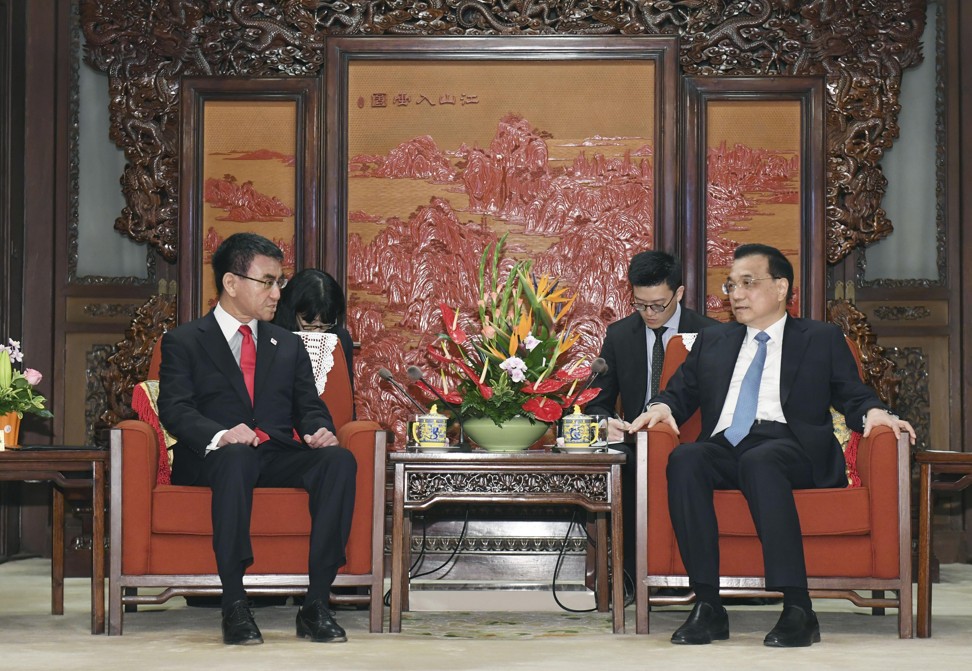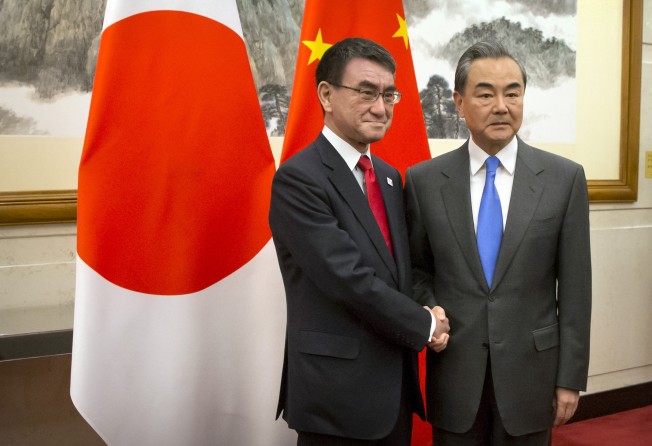
China asks Japan for concrete measures to improve ‘sensitive’ and ‘fragile’ relationship
- Foreign Minister Wang Yi issues plea after meeting Japanese counterpart Taro Kono during his two-day visit to China

Japan has been urged to take “concrete action” to help improve ties with China by Foreign Minister Wang Yi, who warned that elements of their relationship remained “sensitive and fragile”.
At a meeting with his Japanese counterpart Taro Kono in Beijing on Monday, Wang urged Japan to help transform their relationship from one of rivalry to cooperation after years of tension caused by their maritime and historical disputes.
The meeting was part of Kono’s two-day trip to Beijing to prepare for a potential visit by President Xi Jinping in June and to discuss market access and Japanese concerns over intellectual property protections, forced technology transfer and industrial subsidies for Chinese businesses.
Kono also had a courtesy meeting with Premier Li Keqiang, during which Li called for the two countries to “deepen economic cooperation and cultivate third-country markets for the benefit of not only our two countries but also to ensure a stable recovery of the global economy”.
An official who was present at the talks admitted that while the meetings saw “very friendly exchanges” between the two countries’ top officials, there had been little concrete progress on trade – in particular Japan’s demands for China to lift a sweeping import ban on food from 10 Japanese prefectures imposed in the wake of the 2011 Fukashima nuclear disaster.

“Except for the lifting of the ban on rice imports from Niigata prefecture, which was announced [in November] right after Prime Minister Shinzo Abe’s visit to Beijing last October … That’s a positive gesture, but other than that, I don’t know if there was any concrete progress related to trade issues,” said Japanese foreign ministry spokesman Takeshi Osuga during a press briefing on Monday.
Officials from the two countries agreed on Sunday to sign a quarantine pact that would be a precondition for Beijing to lift a ban on Japanese imports imposed after an outbreak of BSE.
Japan had hoped that China’s ongoing trade dispute with the US would make Beijing more willing to offer concessions as it courted other powers.
Japan, along with the European Union, does not support US President Donald Trump’s protectionist approach, but shares Washington’s concerns about issues such as market access in China.
But despite repeated appeals from Tokyo, no progress has been made towards lifting other food import bans.
Beijing aired its own grievances during the two-day meetings, and Osuga said that Chinese officials had expressed their concern that the Chinese tech giant Huawei’s operations in the country would be hampered.
Japan recently introduced a 5G policy that would effectively prevent companies using equipment from Huwei or ZTE.
Osuga said that while the two countries did not go into specifics about their ongoing maritime dispute, Kono called for “positive action” from Beijing in the East China Sea to “truly stabilise” the relations between the two countries.
In late March the Chinese air force flew four long-range bombers and fighter jets through the Miyako Strait, causing Japan to scrambles fighter jets to intercept the Chinese bombers over the East China Sea.
Kono also call for efforts to resume discussions over joint exploration of resources in the disputed waters.
Xi is widely expected to travel to Osaka later this year for the G20 summit, which would allow him to seek support for Beijing’s calls for reform the World Trade Organisation.
Japan would also see Xi’s visit, which would be the first by a Chinese president since 2008, as an important step towards resuming high-level dialogues.
However, the visit has yet to be announced by the Chinese government and it has not yet been confirmed in private, according to an official familiar with the discussions, who spoke on condition of anonymity.
China is also seeking Japanese support for Xi’s Belt and Road Initiative and Toshihiro Nikai, secretary general of the ruling Liberal Democratic Party, will be attending the second Belt and Road Forum in Beijing later this month.